Đề thi vào 10 Tiếng Anh Chuyên năm 2025 (các năm có đáp án)
Tổng hợp đề thi vào lớp 10 môn Tiếng Anh hệ chuyên năm 2025 chọn lọc, có đáp án được sưu tầm từ các trường chuyên trên cả nước. Hi vọng qua bộ đề ôn thi chuyên Tiếng Anh này sẽ giúp bạn tìm hiểu về cấu trúc đề thi, từ đó ra kế hoạch ôn tập & đạt được kết quả cao trong kì thi tuyển sinh vào lớp 10.
Đề thi vào 10 Tiếng Anh Chuyên năm 2025 (các năm có đáp án)
Xem thử 40 đề ôn thi từ các Sở GD Xem thử 80 đề luyện thi Xem thử 5000 bài tập trắc nghiệm ôn vào 10
Chỉ từ 150k mua trọn bộ đề ôn thi Tiếng Anh vào 10 theo cấu trúc mới bản word có lời giải chi tiết:
- B1: gửi phí vào tk:
1133836868- CT TNHH DAU TU VA DV GD VIETJACK - Ngân hàng MB (QR) - B2: Nhắn tin tới Zalo VietJack Official - nhấn vào đây để thông báo và nhận đề thi
Đề vào 10 Tiếng Anh Chuyên năm 2025 (chính thức)
- Đề thi vào 10 Tiếng Anh Chuyên Lam Sơn (Thanh Hóa) năm 2025
- Đề thi vào 10 Tiếng Anh Chuyên Sóc Trăng năm 2025
- Đề thi vào 10 Tiếng Anh Chuyên Vĩnh Phúc năm 2025
- Đề thi vào 10 Tiếng Anh Chuyên Thừa Thiên Huế năm 2025
- Đề thi vào 10 Tiếng Anh Chuyên TP Hồ Chí Minh năm 2025
- Đề thi vào 10 Tiếng Anh Chuyên Hải Phòng năm 2025
- Đề thi vào 10 Tiếng Anh Chuyên Hải Dương năm 2025
- Đề thi vào 10 Tiếng Anh Chuyên Hưng Yên năm 2025
- Đề thi vào 10 Tiếng Anh Chuyên Phổ thông năng khiếu năm 2025
Đề vào 10 Tiếng Anh Chuyên năm 2023 (chính thức)
- Đề thi vào 10 môn Tiếng Anh Chuyên Cà Mau năm 2023
- Đề thi vào 10 môn Tiếng Anh Chuyên ĐH Sư Phạm Hà Nội năm 2023
- Đề thi vào 10 môn Tiếng Anh Chuyên Đồng Tháp năm 2023
- Đề thi vào 10 môn Tiếng Anh Chuyên Hải Phòng năm 2023
- Đề thi vào 10 môn Tiếng Anh Chuyên Hưng Yên năm 2023
- Đề thi vào 10 môn Tiếng Anh Chuyên Lam Sơn (Thanh Hóa) năm 2023
- Đề thi vào 10 môn Tiếng Anh Chuyên TP Hồ Chí Minh năm 2023
Bộ Đề ôn thi vào 10 Tiếng Anh Chuyên
- Đề thi vào lớp 10 Chuyên Tiếng Anh năm 2025 (Đề 1)
- Đề thi vào lớp 10 Chuyên Tiếng Anh năm 2025 (Đề 2)
- Đề thi vào lớp 10 Chuyên Tiếng Anh năm 2025 (Đề 3)
- Đề thi vào lớp 10 Chuyên Tiếng Anh năm 2025 (Đề 4)
- Đề thi vào lớp 10 Chuyên Tiếng Anh năm 2025 (Đề 5)
- Đề thi vào lớp 10 Chuyên Tiếng Anh năm 2025 (Đề 6)
- Đề thi vào lớp 10 Chuyên Tiếng Anh năm 2025 (Đề 7)
- Đề thi vào lớp 10 Chuyên Tiếng Anh năm 2025 (Đề 8)
- Đề thi vào lớp 10 Chuyên Tiếng Anh năm 2025 (Đề 9)
- Đề thi vào lớp 10 Chuyên Tiếng Anh năm 2025 (Đề 10)
- Đề thi vào lớp 10 Chuyên Tiếng Anh năm 2025 (Đề 11)
- Đề thi vào lớp 10 Chuyên Tiếng Anh năm 2025 (Đề 12)
- Đề thi vào lớp 10 Chuyên Tiếng Anh năm 2025 (Đề 13)
Đề thi vào 10 Tiếng Anh Chuyên Lam Sơn năm 2025 (chính thức)
Đáp án Đề thi vào 10 môn Tiếng Anh Chuyên Lam Sơn (Thanh Hóa) năm 2025 tham khảo
Sở Giáo dục và Đào tạo .....
Trường THPT Chuyên Nguyễn Huệ
Kì thi tuyển sinh vào lớp 10 (khối chuyên)
năm 2025
Môn: Tiếng Anh
Thời gian làm bài: 150 phút
(Đề số 1)
PART ONE: PHONETICS – GRAMMAR & VOCABULARY (55 pts)
II. Questions 1-5: Choose the word whose underlined part is pronounced differently from that of the others by circling A, B, C or D and write your answers into the box below. (5.0 pts)
|
1. A. there 2. A. climate |
B. appear B. comprise |
C. wear C. notice |
D. prepare D. divide |
|
3. A. kicked |
B. fixed |
C. pleased |
D. missed |
|
4. A. ring |
B. benefit |
C. wander |
D. wonderful |
|
5. A. slavery |
B. last |
C. guest |
D. towards |
|
Your answers: |
||||
1. |
2. |
3. |
4. |
5. |
II. Questions 6-25: Circle the best option (A, B, C or D) to complete each of the following sentences and write your answers into the box below. (20 pts)
6. That famous book of five chapters.
A. comprises
B. makes
C. has
D. consists
7. He used to his living by delivering vegetables to city hotels.
A. earn
B. gain
C. get
D. make
8. The shop promised to keep the goods for me if I a deposit.
A. made
B. paid
C. gave
D. left
9. We’ll play tennis and we’ll have lunch.
A. so
B. so that
C. then
D. after
10. Nobody was injured in the accident, ?
A. was he
B. wasn’t he
C. were they
D. weren’t they
11. I wouldn’t like to have a snake or a spider as a pet.
A. neither
B. both
C. nor
D. either
12. being ill, she still went to class yesterday.
A. Even though
B. Despite
C. Because
D. Since
13. On the to the town, there is a beautiful wood.
A. way
B. direction
C. street
D. entrance
14. We should try to study hard to our knowledge.
A. better
B. farther
C. lessen
D. strengthen
15. I didn’t her as she was wearing a blond wig.
A. perceive
B. know
C. realize
D. recognize
16. Women's Aid is a UK charity aim is to end domestic violence against women and children.
A. who
B. whose
C. which
D. whom
17. Passover is also an spring festival.
A. ancient
B. anxious
C. annual
D. official
18. The two friends always back up in everything they do.
A. each other
B. one another
C. themselves
D. ourselves
19. Dinosaurs are believed to millions of years ago.
A. have gone out
B. have died out
C. have run off
D. died out
20. –“I’m taking my first exam next week.” –“ .”
A. Cheers
B. Good luck
C. Well done
D. Congratulations
21. – “Something is worrying me?” – “ ”
A. Well, what are you doing?
B. Well, tell me who’s that?
C. Well, tell me what’s worrying you?
D. Well, I know.
22. Wait you get home before you unpack your parcel.
A. during
B. until
C. when
D. after
23. The hotel has been built on the of the lake.
A. border
B. boundary
C. edge
D. front
24. does it take you to do the washing?
A. How fast
B. What time
C. How often
D. How long
25. Due to bad weather, the picnic has been until next Sunday.
A. put off
B. taken off
C. put down
D. switched off
Your answers:
6. |
7. |
8. |
9. |
10. |
11. |
12. |
13. |
14. |
15. |
16. |
17. |
18. |
19. |
20. |
21. |
22. |
23. |
24. |
25. |
III. Questions 26-35: Use the correct form of the words in brackets to complete sentences and write your answers into the box below. (10 pts)
26. Recently, health foods have increased in . (POPULAR)
27. She presented her ideas clearly and . (LOGIC)
28. Nowadays knowledge of English can be a problem in business. (SUFFICIENCY)
29. Sorry about the mistakes, I the instruction you gave me. (UNDERSTAND)
30. He is interested in the of old building. (PRESERVE)
31. Housework has been regarded as women’s work. (TRADITION)
32. The whole country is trying to get rid of . (POOR)
33. We will live happier and life if we keep our environment clean. (HEALTH)
34. It is of you to cheat in the exam. (HONEST)
35. is now a serious problem in many countries. (FOREST)
Your answers:
26. |
27. |
28. |
29. |
30. |
31. |
32. |
33. |
34. |
35. |
IV. Questions 36-45: Put the verbs in brackets into the correct form or tense and write your answers into the box below. (10 pts)
- He (36. wear) the same old coat since he (37. move) here.
- A lot of people (38. kill) by AIDS recently, and I wish nobody (39. die) any more.
- After (40. stop) by the police, the man admitted (41. steal) the car but denied driving at 100 miles an hour.
- We (42. have) our house (43. repair) next month.
- My sister is going to graduate from Hanoi University in July. By then, I (44. complete) my entrance examination.
- His doctor advised (45. cut) down on the amount of fat food.
Your answers:
36. |
37. |
38. |
39. |
40. |
41. |
42. |
43. |
44. |
45. |
V. Questions 46-55: Fill each gap with a suitable preposition to complete each of the sentences. (10 pts)
46. Wearing uniforms helps poor students feel equal others.
47. He made a good impression his first day at work.
48. Egypt is famous ancient Pyramids.
49. Where is Anna? She should be here now.
50. There are usually a lot of parties New Year’s Eve.
51. They revealed that he had supplied terrorist organization weapons.
52. The certificates can be exchanged goods in any of our stores.
53. We plan to impose limitations the use of cars in the city.
54. Their stated aim was to free women domestic slavery.
55. I think they’ve gone to the airport to see their boss .
Your answers:
46. |
47. |
48. |
49. |
50. |
51. |
52. |
53. |
54. |
55. |
PART TWO: READING (25 pts)
I. Questions 56-65: Read the passage carefully, then fill in each blank with ONE suitable word and write your answers into the box below. (10 pts)
People appear to learn in different ways. Some people expect to make mistakes in their studies and are capable (56) _ benefiting from their mistakes. They don’t mind (57) corrected by their teacher and indeed often ask to be corrected.
Others, (58) , dislike making mistakes. They try to avoid doing anything (59) they might do badly. They would (60) perfect something in small steps and be sure they have got it right than attempt to do task (61) on a subject they don’t feel they have finished exploring yet.
Both (62) of learning seem to be equally valid, but a combination of the two may be the
(63) solution. In order to learn effectively, students have to remember to take risk sometimes. But they also have to feel comfortable and secure with (64) they’re doing so as not to become demotivated. All students should at (65) think about questioning the way that they approach learning.
Your answers:
56. |
57. |
58. |
59. |
60. |
61. |
62. |
63. |
64. |
65. |
II. Questions 66-75: Read the text below and decide which answer A, B, C or D best fits each numbered blank and write your answers into the box below. (10 pts)
Environmental Concerns
Earth is the only (66) we know of in the universe that can support human life. (67) human activities are making the planet less fit to live on. As the western world (68) on consuming two-thirds of the world's resources while half of the world's population do so (69) to stay alive, we are rapidly destroying the very resource we have by which all people can survive and prosper. Everywhere
fertile soil is (70) built on or washed into the sea. Renewable resources are exploited so much that they will never be able to recover completely. We discharge pollutants into the atmosphere without any thought of the consequences. As a (71) the planet's ability to support people is being reduced at the very time when rising human numbers and consumption are (72) increasingly heavy demands on it. The Earth's natural resources are there for us to use. We need food, water, air, energy, medicines, warmth, shelter and minerals to (73) us fed, comfortable, healthy and active. If we are sensible in how we use the resources they will (74) indefinitely. But if we use them wastefully and excessively they will soon run (75) and everyone will suffer.
66. A. situation |
B. place |
C. position |
D. site |
|
67. A. Although |
B. Still |
C. Yet |
D. Despite |
|
68. A. continues |
B. repeats |
C. carries |
D. follows |
|
69. A. already |
B. just |
C. for |
D. entirely |
|
70. A. sooner |
B. neither |
C. either |
D. rather |
|
71. A. development |
B. result |
C. reaction |
D. product |
|
72. A. doing |
B. having |
C. taking |
D. making |
|
73. A. hold |
B. maintain |
C. stay |
D. keep |
|
74. A. last |
B. stand |
C. go |
D. remain |
|
75. A. out |
B. off |
C. over |
D. down |
|
Your answers: |
||||
66. |
67. |
68. |
69. |
70. |
71. |
72. |
73. |
74. |
75. |
III. Questions 76-80: Read the following passage and choose the correct answer (A, B, C or D). Write your answers into the box below. (5pts)
Each nation has many good people who take care of others. For example, some high school and college students in the United States often spend many hours as volunteers in hospitals, orphanages or homes for the aged. They read books to the people in these places, or they just visit them, play games with them or listen to their problems.
Other young volunteers work in the homes of people who are sick or old. They clean up their houses, do their shopping or mow their lawns. For boys who no longer have fathers, there is an organization called Big Brothers. College students and other men take these boys to baseball games or on fishing trips and help them to get to know things that boys usually learn from their fathers.
Some high school students take part in helping disadvantaged or handicapped children. They give care and comfort to them and help them to overcome their difficulties. Young college and university students participate in helping the people who have suffered badly in wars or natural disasters. During summer vacations, they volunteer to work in remote mountainous areas to provide education for children.
Each city has a number of clubs where boys and girls can go to play games or learn craft. Some of these clubs show movies or organize short trips to interest. Most of these clubs use a lot of high school and college students as volunteers because they are young enough to remember the problems of younger boys and girls.
Volunteers believe that some of the happier people in the world are those who help to bring happiness to others.
76. Volunteers usually help those who are sick or old in their homes by .
A. moving the lawns, doing shopping and cleaning up their houses
B. telling them stories, and singing and dancing for them
C. cooking, sewing or washing their clothes
D. taking them to the baseball games
77. Big Brother is .
A. the name of a club
B. a home for children who have no brothers
C. the name of a team
D. an organization for boys who no longer have fathers
78. Most of the boys’ and girls’ club use many high school and college students as volunteers because
.
A. they have a lot of free time
B. they can understand the problems of younger boys and girls
C. they know how to the work
D. they are good at playing games and learning crafts
79. Volunteers believe that .
A. in order to make others happy, they have got to be happy
B. the happiest people in the world are those who make themselves happy
C. the happiest people in the world are those who are young and healthy
D. bringing happiness to others makes them the happiest people in the world
80. What is the best title for the passage?
A. Taking care of others
B. Volunteers: the happiest people in the world
C. Voluntary work in the United States
D. Helping old and sick people in the United States
Your answers:
76. |
77. |
78. |
79. |
80. |
PART THREE: WRITING (20 pts)
I. Questions 81-85: Choose the correct sentence (A, B, C or D) that is made from the words given. Write your answers into the box below. (5pts)
81. very / few / airports / United States / modern / as that / Atlanta.
A. Very few airports in the United States are as modern as that of Atlanta.
B. Very a few airports in the United States are more modern as that Atlanta.
C. Very few of airports in the United States are moderner as that in Atlanta.
D. Very a few of the airports in the United States are as modern as that of Atlanta.
82. both / term paper / final exam / often require / college class.
A. Both a term paper as well as a final exam have often required for a college class.
B. Both a term paper and a final exam are often required for a college class.
C. Both term paper and final exam as well is often required for a college class.
D. Both a term paper and also a final exam has often required for a college class.
83. people / competitive / more likely / suffer / effects / stress / health.
A. People are competitive and more likely suffering by the effects of stress for their health.
B. People, competitive and more likely, suffer from the effects of stress on their health.
C. People are competitive and more likely to be suffered from the effects of stress for their health.
D. People who are competitive are more likely to suffer from the effects of stress on their health.
84. color / star / depend / heat / energy / produce.
A. The color of a star depends on the heat and the energy it produces.
B. The color from a star is depended on the heat and the energy to produce.
C. The color of a star that depends on the heat and the energy produces.
D. The color star depends on the heat and the energy it produces.
85. those / us / smoke / have lungs / x-ray / regularly.
A. Those of us who smoke should have our lungs x-rayed regularly.
B. Those of us smoke and have the lungs x-ray regularly.
C. Those of us who smoke and have the lungs x-rayed regularly.
D. Those of us smoke and so have our lungs x-ray regularly.
Your answers:
81. |
82. |
83. |
84. |
85. |
II. Questions 86-90: Choose the underlined part (A, B, C or D) that needs correcting and CORRECT IT. (5 pts)
86. (A) Asking about the date of the election, the prime minister (B) commented that (C) no decision (D) had yet been made.
87. Why (A) do you think (B) you are allowed (C) to criticize me (D) as that?
88. Buying clothes (A) are often (B) a very time-consuming practice because those clothes that a person likes (C) are rarely the ones that fit (D) him or her.
89. The (A) fish and chips that my mother (B) is cooking in the kitchen (C) taste (D) delicious.
90. Many theories on (A) conserving the purity of water (B) has been proposed but no one (C) has been as
(D) widely accepted as this one.
Your answers:
86. |
87. |
88. |
89. |
90. |
III. Questions 91-95: Rewrite each of the following sentences in such a way that it means the same as the sentence printed before it. Use the bold words given in brackets. Do not alter the given words in any way. (5 pts)
91. It took us three hours to find a room for the night. (SPENT)
→We
92. Would you rather I stayed with you during the holidays? (PREFER)
→Would you
93. The English test was not easy enough for me to do well. (SO)
→ The English test
94. The police said Jim had stolen the money. (ACCUSED)
→ The police
95. Because of his illness he could not work effectively. (IMPOSSIBLE)
→ His illness
IV. Questions 96-100: Rewrite each of the following sentences in such a way that it means the same as the sentence printed before it. Use the bold words given in brackets. Do not alter the given words in any way. (5 pts)
96. New Year comes near. People are busy.
→ The nearer
97. Both Peter and John don’t like tea.
→ Neither
98. Mary will only come to the party if Peter is invited.
→ Unless
99. In spite of the bad weather, we went swimming.
→ Although
100. He is very sorry he didn’t come to the meeting yesterday.
→ He apologies
Sở Giáo dục và Đào tạo ..... Trường THPT Chuyên Kì thi tuyển sinh vào lớp 10 (khối chuyên) năm 2025 Môn: Tiếng Anh Thời gian làm bài: 150 phút (Đề số 2) I. MULTIPLE CHOICE QUESTIONS: Choose the correct answer to fill in the blank. 1. The newspaper’s ………. has been falling for a number of years. a. Audience b. readership c. reputation d. status 2. I prefer ………. newspaper to tabloid. a. Broadsheet b. widespread c. expansive d. extensive 3. He was one of the BBC’s best known war ………. a. Reporters b. journalists c. followers d. correspondents 4. The advertising space that is divided into sections is commonly known as the ………. ads. a. Small b. confidential c. classified d. small print 5. The Prime Minister is considering a cabinet ………. a. Reorganisation b. rearrangement c. reshuffle d. reconstruction 6. I suscribe to a ………. literary journal. a. Three-monthly b. quarterly c. seasonal d. quartered 7. They want to erect a huge satellite ………. right opposite my house a. Plate b. record c. platter d. dish 8. I cant give you that information, you have to speak with the press………. . a. Officer b. official c. executive d. administrator 9. We will take a short ………. break and we will be right back. a. Commercial b. advertising c. promotional d. publicity 10. To find out what is on Tv, just look in the TV&radio ………. a. Programmes b. schedules c. listings d. records 11. The match will be screened on TV, with ………. commentary by Gray. a. Lively b. live c. alive d. living 12. There will be ………. coverage of the games on most channels. a. Complete b. general c. widespread d. extensive 13. His supporters did everything they could to ………. him on the race. a. Push b. spur c. drive d. prod 14. One of the guests stood up to the ………. virtues of the fine food. a. Worship b. admire c. appreciate d. extol 15. He did not mean to be offensive; it was quite an ………. remark. a. Innocuous b. inaugral c. intergral d. insidious 16. The job creation scheme is still in its ………. a. Childhood b. babyhood c. opening d. infancy 17. The Prime Minister gave an………. response to the question. a. Evading b. invasive c. evasive d. invading 18. She had a(n)………. interest in holding a bank account. a. Vested b. invested c. shadowed d. implied 19. I assure you that I………. no hostile feelings towards you. a. Shelter b. harbour c. embrace d. cover 20. I am sick of hearing the same old ………. in meetings. a. Plenitudes b. placidities c. pliabilities d. platitudes 21. The passenger cabins which were on the upper ………. were renovated last year. a. Floor b. deck c. level d. ground 22. A note in the Captain’s log stated that it was the roughest………. he had ever experienced. a. Passage b. crossing c. crossroad d. passing 23. Enormous swells roused by ferocious winds made it impossible to………. the ship to safety. a. Direct b. control c. steer d. drive 24. The stricken vessel ran………. on a large reef. a. Aside b. ashore c. aground d. around 25. Of those on ………. , few survived to relate the tragedy of the Pacific Queen. a. Board b. side c. hand d. aboard 26. Without delay, she booked a(n)………. flight to Manila so as to be in time for the meeting. a. Instant b. direct c. straight d. even 27. Poor ………. led to the pilot’s decision to request a landing at an alternative airport. a. Sight b. clarity c. visibility d. vision 28. Julia preferred to sleep rather than partake of the………. entertainment. a. Flying b. flight c. in-flight d. in-flying 29. She was rudly awakened by a sudden bout of ………. turbulence. a. Stern b. somber c. weighty d. heavy 30. Their ………. from the airport to the hotel was speedily arranged. a. Transfer b. translocation c. move d. relocation II. GUIDED CLOZE TEST: Choose the word or phrase that best fits each space in the following passage. Scientists have been investigating chimpanzee culture for several decades, but too often their studies contained a crucial (01) _____. Most attempts to document cultural diversity among chimpanzees have (02)_____ solely on officially published (03) _____ of the behaviors recorded at each research site. But this approach probably (04) _____ a good deal of cultural variation for three reasons. First, scientists typically don't publish a(n) (05) _____ list of all the activities they do not see at a particular location. Yet this is exactly what we need to know-which behaviors were and were not observed at each site. Second, many reports describe chimpanzee behaviors without saying (06) _____ common they are; with- out this information, we can't determine whether a particular action was a once-in-a-lifetime aberration or a routine event that should be considered part of the animals' culture. Finally, researchers' descriptions of potentially significant chimpanzee behaviors frequently lack (07) _____ detail, making it difficult for scientists working at other spots to record the presence or absence of the activities. To (08) _____ these problems, the two of us decided to take a new approach. We asked field researchers at each site for a list of all the behaviors they suspected were local traditions. With this information in hand, we pulled together a comprehensive list of 65 (09) _____ for cultural behaviors. Then we distributed our list (10) _____ the team leaders at each site. In consultation with their colleagues, they classified each behavior (11) _____ of its occurrence or absence in the chimpanzee community (12) _____. The key categories were customary behavior (occurs in most or all of the able-bodied members of at least one age or sex class, such as all adult males), habitual (less common than customary but occurs repeatedly in several individuals), present (seen at the site but not habitual), absent (never seen), and unknown. Our inquiry concentrated on seven sites with chimpanzees habituated to human onlookers; all told, the study compiled a total of more than 150 years of chimpanzee observation. The behavior patterns we were particularly interested in, of course, were those absent in at least one community, yet habitual or customary in at least one other; this was our criterion for denoting any behavior a cultural variant. (Certain behaviors are absent for specific local reasons, however, and we excluded them from consideration. For example, although chimpanzees at Bossou scoop tasty algae from pools of water with a stick, chimpanzees else- where don't do this, simply because algae are not present.) The extensive survey turned up (13) _____ 39 chimpanzee (14) _____ of behavior that should be labeled as cultural variations, including (15) _____ forms of tool use, grooming techniques and courtship gambits, several of which are illustrated throughout this article. This cultural richness is far in excess of anything known for any other species of animal 01: A. flaw B. defect C. wrong-doing D. error 02: A. put B. imposed C. relied D. elaborated 03: A. flies B. packs C. accounts D. history 04: A. ignores B. dismisses C. excludes D. overlooks 05: A. tense B. intensive C. intense D. extensive 06: A. how B. what C. whether D. how often 07: A. subsequent B. substantial C. sufficient D. sustainable 08: A. heal B. cure C. condition D. remedy 09: A. replicas B. candidates C. contestants D. items 10: A. to B. for C. into D. towards 11: A. on behalf of B. in accordance with C. with respect of D. in terms of 12: A. studied B. constituted C. facilitated D. learned 13: A. less than B. no fewer than C. in sum D. more or so 14: A. sets B. styles C. norms D. patterns 15: A. numerable B. numeric C. numerous D. outnumbered III. READING: Alfred Nobel was born in Stockholm on October 21,1833. His father, Immanuel Nobel, was an engineer and inventor who built bridges and buildings in Stockholm. In connection with his construction work, Immanuel Nobel also experimented with different techniques for blasting rocks. Alfred's mother, born Andriette Ahlsell, came from a wealthy family. Due to misfortunes in his construction work caused by the loss of some barges of building material, Immanuel Nobel was forced into bankruptcy the same year Alfred Nobel was born. In 1837 Immanuel Nobel left Stockholm and his family to start a new career in Finland and in Russia. To support the family, Andriette Nobel started a grocery store which provided a modest income. Meanwhile, Immanuel Nobel was successful in his new enterprise in St. Petersburg, Russia. He started a mechanical workshop which provided equipment for the Russian army, and he also convinced the Tsar and his generals that naval mines could be used to block enemy naval ships from threatening the city. The naval mines designed by Immanuel Nobel were simple devices consisting of submerged wooden casks filled with gunpowder. Anchored below the surface of the Gulf of Finland, they effectively deterred the British Royal Navy from moving into firing range of St Petersburg during the Crimean War (1853-1856). Immanuel Nobel was also a pioneer in arms manufacture and in designing steam engines. Successful in his industrial and business ventures, Immanuel Nobel was able, in 1842, to bring his family to St.Petersburg. There, his sons were given a first class education by private teachers. The training included natural sciences, languages and literature. By the age of 17, Alfred Nobel was fluent in Swedish, Russian, French, English and German. His primary interests were in English literature and poetry as well as in chemistry and physics. Alfred’s father, who wanted his sons to join his enterprise as engineers, disliked Alfred’s interest in poetry and found his son rather introverted. In order to widen Alfred’s horizons, his father sent him abroad for further training in chemical engineering. During a two-year period Alfred Nobel visited Sweden, Germany, France and the United States. In Paris, the city he came to like best, he worked in the private laboratory of Professor T. J. Pelouze, a famous chemist. There he met the young Italian chemist Ascanio Sobrero who, three years earlier, had invented nitroglycerine, a highly explosive liquid. Nitroglycerine was produced by mixing glycerine with sulfuric and nitric acid, it was considered too dangerous to be of any practical use. Although its explosive power greatly exceeded that of gunpowder, the liquid would explode in a very unpredictable manner if subjected to hesft and pressure. Alfred Nobel became very interested in nitroglycerine and how it could be put to practical use in construction work. He also realized that the safety problems had to be solved and a method had to be developed for the controlled detonation of nitroglycerine. In the United States he visited John Ericsson, the Swedish American engineer who had developed the screw propeller for ships. In 1852 Alfred Nobel was asked to come back and work in the family enterprise which was booming because of its deliveries to the Russian army. Together with his father he performed experiments to develop nitroglycerine as a commercially and technically useful explosive. The market for dynamite and detonating caps grew very rapidly and Alfred Nobel also proved himself to be a very skillful entrepreneur and businessman. By 1865 his factory in Krummel - near Hamburg, Germany was exporting nitroglycerine explosives to other countries in Europe, America, and Australia. Over the years he founded factories and laboratories in some 90 different places in more than 20 countries. Although he lived in Paris much of his life, he was constantly traveling. Victor Hugo at one time described him as “Europe’s richest vagabond”. When he was not traveling or engaging in business activities, Nobel himself worked intensively in his various laboratories, first in Stockholm and later in Germany, Scotland, France, Karlskoga, Sweden, and Italy. He focused on the development of explosives technology as well as other chemical inventions, including such materials as synthetic rubber, leather, and silk. By the time of his death in 1896. he had 355 patents. Intensive work and travel did not leave much time for a private life. At the age of 43 he was feeling like an old man. At this time he advertised in a newspaper “Wealthy, highly-educated elderly gentleman seeks lady of mature age, versed in languages, as secretary and supervisor of household.” The most qualified applicant turned out to be an Austrian woman. Countess Bertha Kinsky. After working a very short time for Nobel, she decided to return to Austria to marry Count Arthur von Suttner. In spite of this Alfred Nobel and Bertha von Suttner re¬mained friends and kept writing letters to each other for decades. Over the years Bertha von Suttner became increasingly critical of the arms race. She wrote a famous book, Lay Down Your Arms and became a prominent figure in the peace movement. Alfred Nobel died in San Remo, Italy, on December 10,1896. When his will was opened it came as a surprise that his fortune was to be used for Prizes in Physics, Chemistry, Physiology or Medicine, Literature and Peace. The executors of his will were two young engineers, Ragnar Sohlman and Rudolf Liljequist. They set about forming the Nobel Foundation as an organization to take care of the financial assets left by Nobel for this purpose and to coordinate the work of the Prize-Awarding Institutions. This was not without its difficulties since the will was contested by relatives and questioned by authorities in various countries. 1. The author’s perspective toward Alfred Nobel could best be described as...... A. personal B. historical C. critical D. emotional 2. The word “they” in paragraph 2 refer to.... A. British Royal Navy B. steam engines C. naval mines D. the Tsar and his generals 3. According to the passage, why did Alfred Nobel become a chemist? A. His father pushed him in that direction B. He wanted to follow in his father's footsteps C. He had no other options D. He had lost interest in becoming a poet 4. The word “introverted” in the passage is closest in meaning to..... A. gregarious B. outgoing C. reserved D. sociable 5. How many patents did Alfred Nobel have by the time of his death? A. 355 B. 1896 C. 90 D.1865 6. Which of the following could best replace the phrase “widen Alfred’s horizons” in paragraph 3? A. provide Alfred with more experience B. show Alfred a beautiful sunset C. limit Alfred's exposure to the world D. maintain Alfred's current level of knowledge 7. Which of the following is NOT a Nobel Prize category? A. Chemistry B. Physics C. Literature and Peace D. Psychiatry 8. It can be inferred that Alfred Nobel’s most famous invention was..... A. nitroglycerine B. synthetic silk C. the steam engine D. dynamite 9. Which of the following words or phrases is LEAST accurate in describing Alfred Nobel? A. visionary B. innovative C. prosaic D. altruistic 10. The word “versed” in the passage is closest in meaning to.... A. awkward B. accomplished C. incompetent D. graceiess IV. OPEN CLOZE TEST: Supply each blank with one suitable word. PASSAGE 1: Many educators believe that it is better for students to (1) _____ school all year round than to have a long summer vacation. Ideally, the summer can (2) _____ every bit as productive as the time spent in a classroom. The vacation should be a carefree time, spent outdoors or with family, but, (3) _____ that most parents work, it is all too often the case that children are left unsupervised. All students forget a certain amount of (4)_____ they have learned so teachers are obliged to spend time at the beginning of the year reviewing parts of the curriculum from the (5) _____ grade. Studies have shown that children from low-income families fall (6)_____ behind during the summer than children from wealthier backgrounds. One study found that while middle-class children slightly improved their reading skills over the summer months, their (7) _____from low-income families lost more than two months in reading achievement. In order to (8) _____ the problem, some school districts have adopted a year-round schedule with a series of shorter breaks (9)_____ of a three-month summer vacation. A national study (10) _____ out by the Ohio State University found, however, that year-round schools had no significant impact (11) _____ how much students learn. They found that children learned about as (12) _____ in year-round schools using a nine-month calender. And while poorer students at the beginning suffers learning loss during the summer months, those at the year-round schools also did (13) _____ during the shorter breaks. The author of the (14)_____ suggested that poor students (15) _____ to attend more days of school, otherwise they will fall behind. PASSAGE 2: Also sgraffito, in art, a technique of producing a design by incising or (01) _____ through a surface layer of paint or plaster to reveal a contrasting undercoat. The term is (02) _____ from an Italian word meaning “scratched”. True graffito techniques are found primarily in (03) _____, medieval, and Renaissance art, but the (04) _____ is usually extended to include any technique that involves scratching a design on stone or plaster with a sharp instrument. Graffiti are abundant in ancient Egyptian and Roman art and have been found in Pompeii and the Roman catacombs. Many (05) _____ ancient graffiti, scratched on walls by passersby, have been unearthed, the most famous of which is a caricature of Christ on the (06) _____, found on the walls of the Domus Gelotiana on the Palatine Hill in Rome in 1856. Graffito techniques involving the incising of gold leaf in illustrated manuscripts were common in the Middle Ages, and the facades of Renaissance palaces often sported differently colored coats of plaster (07) _____ graffito effects. In the 20th century (08) _____ have used a free style of graffito technique in (09) _____ large areas are cut away from the surface layer, often producing graduated tones midway between the overlay and the (10) _____. V. ERROR IDENTIFICATION: Choose the underlined part that needs correction. (D) VI. WORD FORMS: Supply the appropriate forms of the words in the brackets. VII. SENTENCE TRANSFORMATION: Rewrite the following sentences without changing the meaning. You have to use the exact word given in brackets for each sentence. 1. He sings well and plays the guitar well. Not only_________________________________________________________________________ 2. In spite of his serious sickness, he did well in the exam. Although ________________________________________________________________________ 3. They came to the concert late, so they didn’t have good seats. If________________________________________________________________________________ 4. Do your homework first, and I’ll let you play the computer games. I won’t allow_____________________________________________________________________ 5. It was a long time ago when I saw a movie. It has____________________________________________________________________________ 6. My younger brother was finally able to get a job. My younger brother finally succeeded ____________________________________________ 7. They have just sold the old house at the end of the road. The old house ___________________________________________________________________ 8. You don’t have to finish the work today. It________________________________________________________________________________ 9. Liz is a better pianist than Mai. Mai does ________________________________________________________________________ 10. He was annoyed because his son often came home late. He objected_________________________________________________________________________ VII. SENTENCE REARRANGEMENT
Xem thử 40 đề ôn thi từ các Sở GD
Xem thử 80 đề luyện thi
Xem thử 5000 bài tập trắc nghiệm ôn vào 10
Để học tốt lớp 10 các môn học sách mới: Đã có app VietJack trên điện thoại, giải bài tập SGK, SBT Soạn văn, Văn mẫu, Thi online, Bài giảng....miễn phí. Tải ngay ứng dụng trên Android và iOS.
Loạt bài Đề thi vào lớp 10 môn Tiếng Anh (có đáp án) được các Giáo viên hàng đầu biên soạn giúp bạn ôn luyện và giành được điểm cao trong kì thi vào lớp 10 môn Tiếng Anh. Nếu thấy hay, hãy động viên và chia sẻ nhé! Các bình luận không phù hợp với nội quy bình luận trang web sẽ bị cấm bình luận vĩnh viễn.
Tủ sách VIETJACK luyện thi vào 10 cho 2k11 (2026):

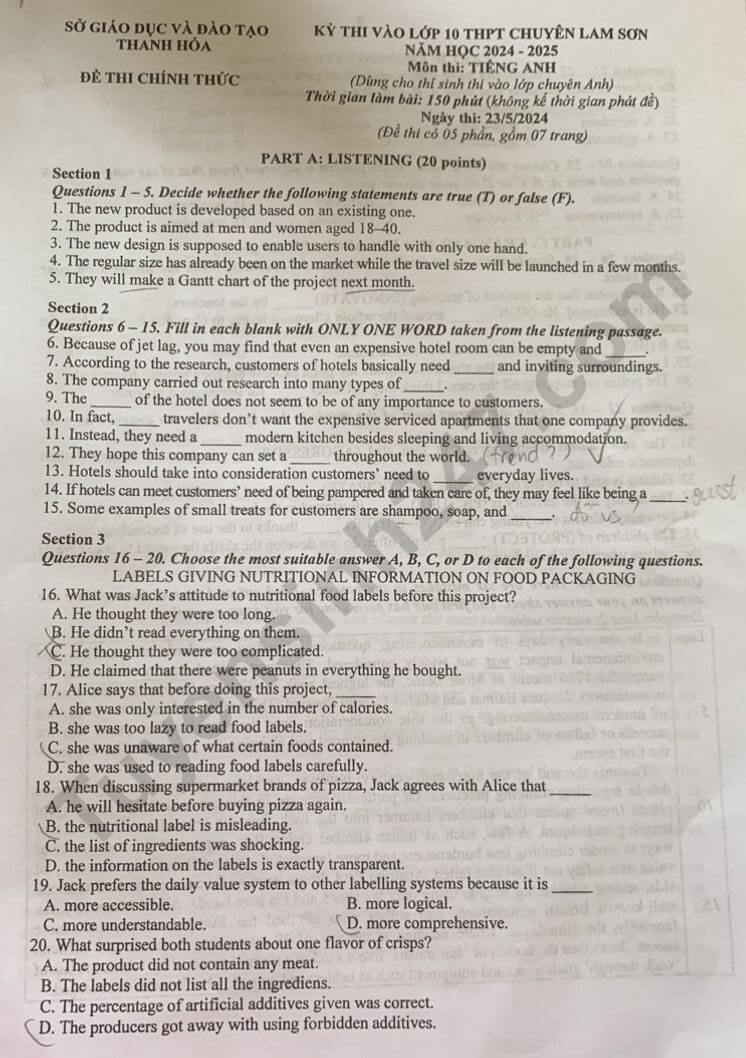
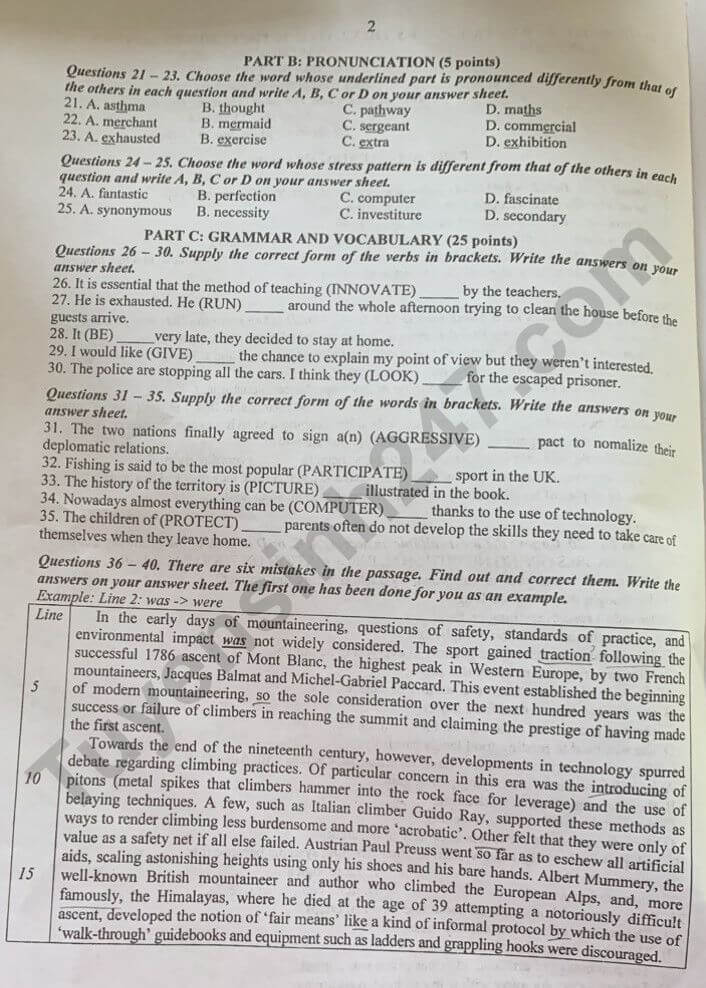
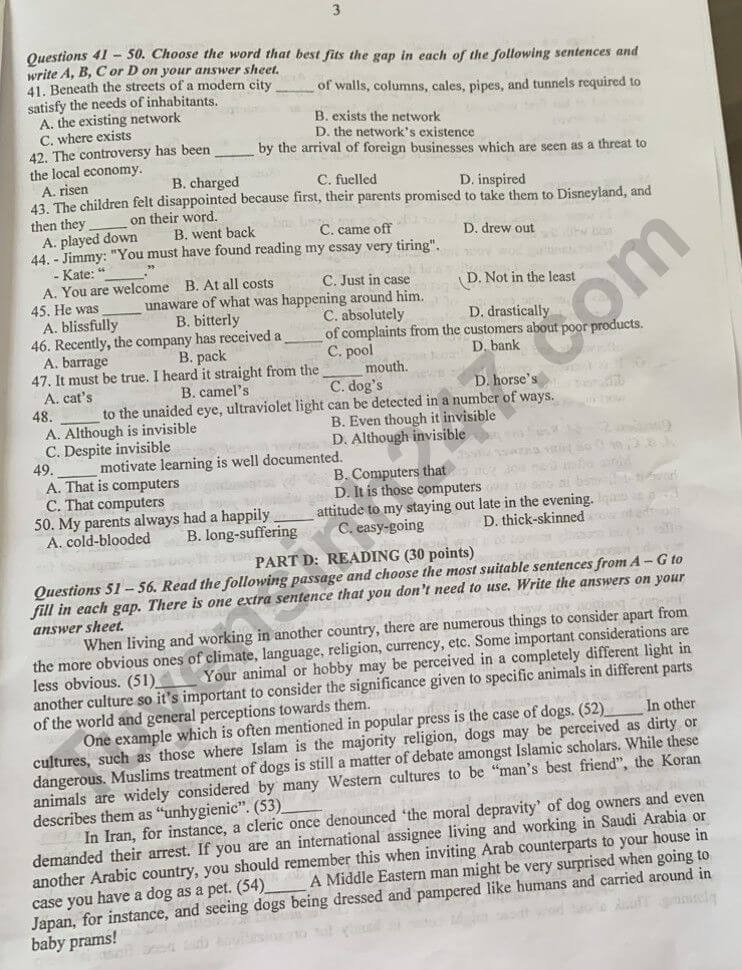
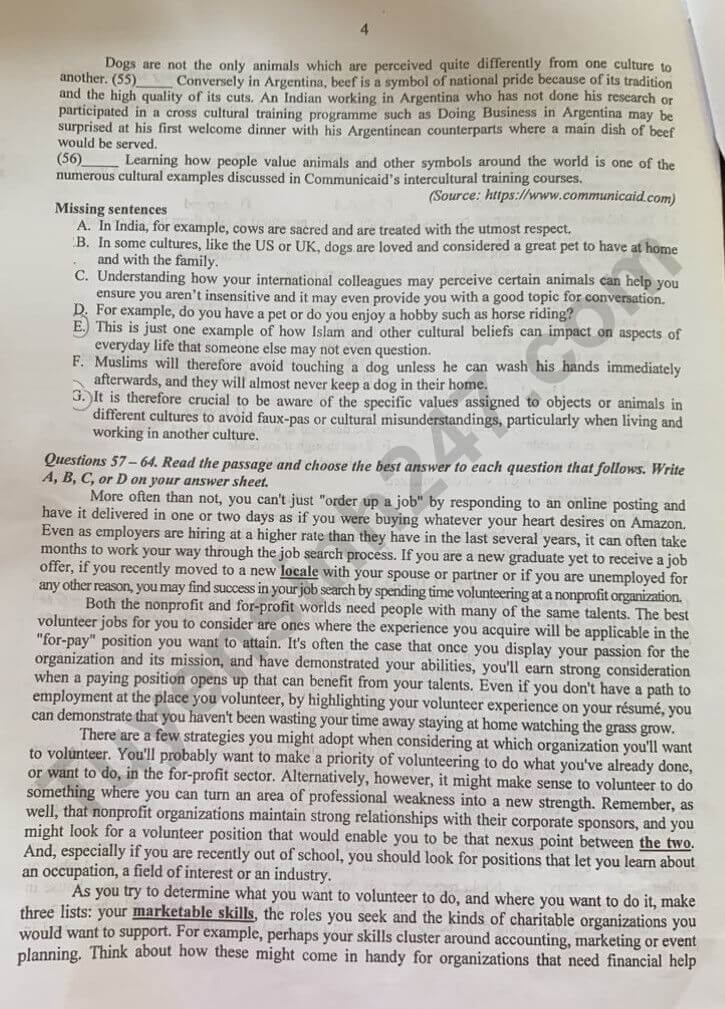
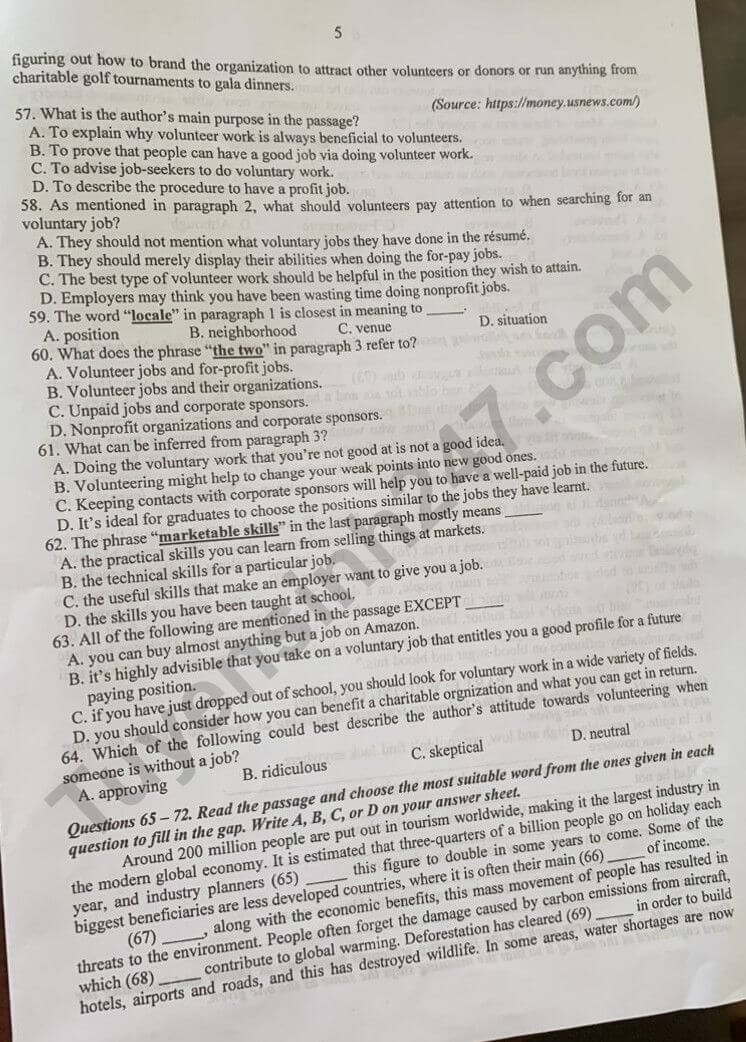
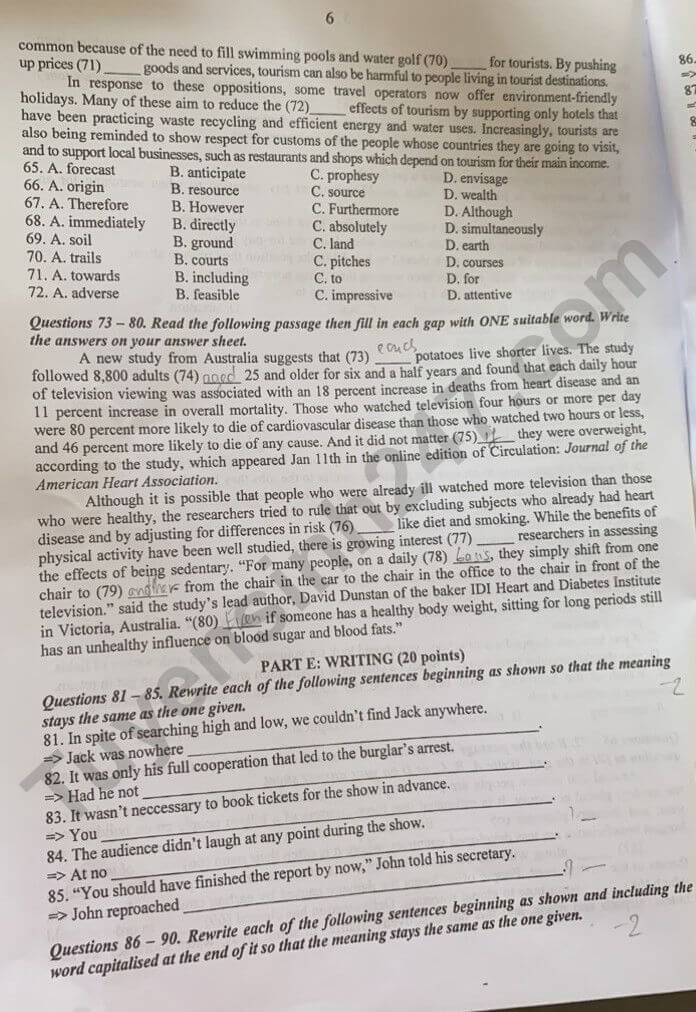
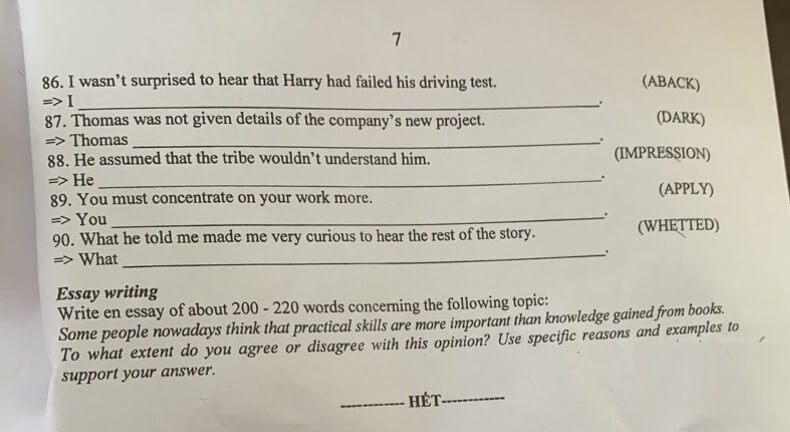
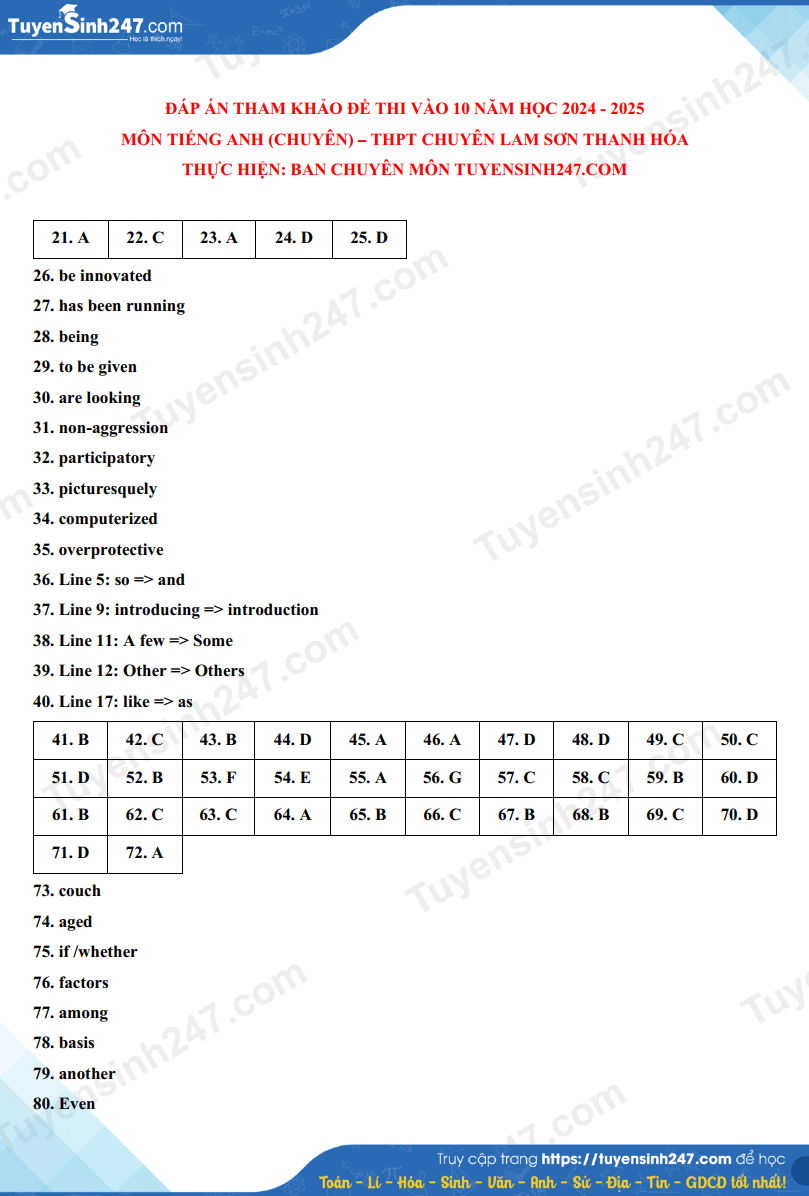
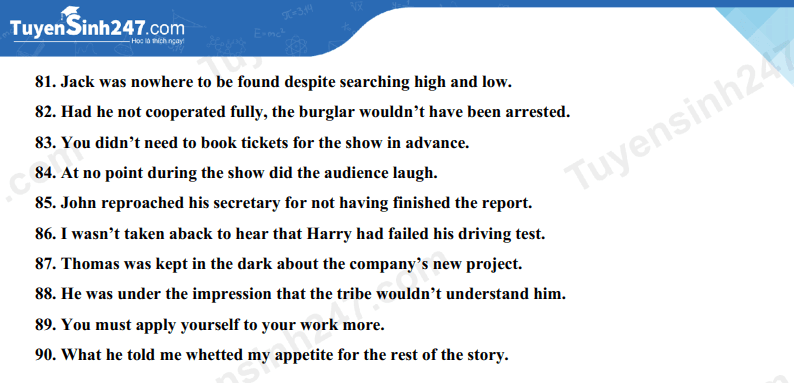






 Giải bài tập SGK & SBT
Giải bài tập SGK & SBT
 Tài liệu giáo viên
Tài liệu giáo viên
 Sách
Sách
 Khóa học
Khóa học
 Thi online
Thi online
 Hỏi đáp
Hỏi đáp

